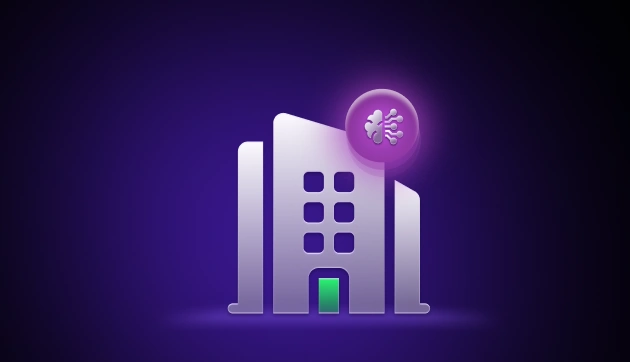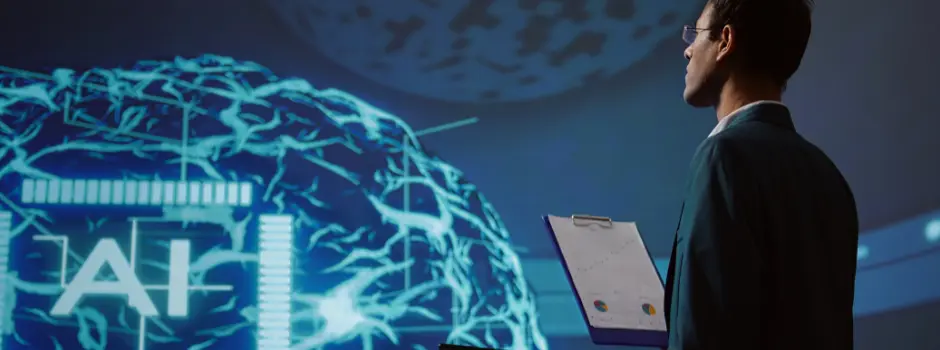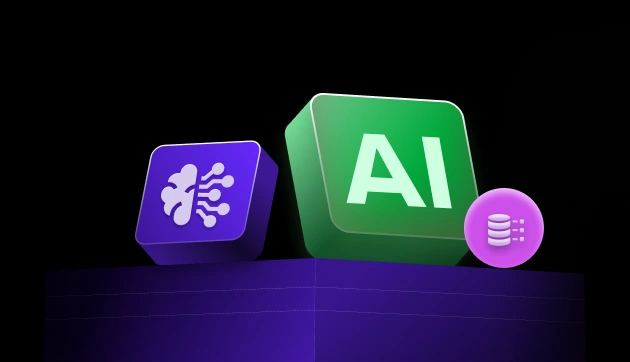
Artificial Intelligence vs Human Intelligence: A Definitive Comparison
Dec 21, 2024 5 Min Read 9975 Views
(Last Updated)
One of the hot topics that’s been trending these days is that artificial intelligence will replace human intelligence and make us lose our jobs. This has been the trend for the last couple of years as AI innovations like ChatGPT were made public. As people started using it extensively, there has been a growing concern that Artificial Intelligence will slowly take over human intelligence.
But, is that true? Will there be a future where humans will be slaves to Artificial Intelligence? The answer lies in this article. It is indeed true that people started to depend too much on artificial intelligence these days but those who know how to use AI will be on the safe side.
Let us explore more about artificial intelligence and the way it’s been developing over the years, you’ll also understand what we mean when we say human intelligence and finally a brief comparison between those two. So, without further ado, let’s get started.
Table of contents
- Artificial Intelligence vs Human Intelligence: Differences Between Them
- What is Artificial Intelligence?
- Machine Learning (ML)
- Deep Learning
- Natural Language Processing (NLP)
- Computer Vision
- Robotics
- What is Meant by Human Intelligence?
- Reasoning and Problem-Solving
- Learning and Adaptation
- Memory
- Language and Communication
- Self-awareness and Consciousness
- Ethical and Moral Decision-Making
- Is Artificial Intelligence better than Human Intelligence?
- Conclusion
- FAQs
- What is the fundamental difference between artificial intelligence and human intelligence?
- Which tasks can AI perform better than humans?
- Can AI learn from experience?
- Is it possible for AI to develop consciousness like humans?
- Is there a future where AI could surpass human intelligence?
Artificial Intelligence vs Human Intelligence: Differences Between Them

| Aspect | Artificial Intelligence (AI) | Human Intelligence |
| Learning and Adaptation | AI can rapidly learn and adapt to large datasets and repetitive tasks. It can perform calculations and data processing at incredible speeds. However, it lacks the intuitive, flexible learning and adaptability of humans and struggles with tasks that require common-sense reasoning or understanding of context. | Humans have a remarkable ability to learn and adapt to new and diverse situations. They possess intuitive understanding and common-sense reasoning. But Learning can be slower, and humans can be subject to cognitive biases. |
| Creativity | AI can generate creative outputs, such as art, music, and text, based on learned patterns. It can perform creative tasks efficiently. AI creativity is often based on existing data and lacks true innovation or emotional depth. | Humans possess deep creativity, producing original art, literature, innovations, and novel problem-solving. They draw on emotions, personal experiences, and intuition. Creative output can be inconsistent and influenced by factors like mood and stress. |
| Emotional Intelligence | AI can recognize and simulate emotions in limited ways, aiding in applications like chatbots and sentiment analysis. It lacks genuine emotional understanding and empathy, which humans have. | Humans have profound emotional intelligence, allowing them to empathize, understand, and respond to others’ emotions. Emotional intelligence can vary widely among individuals, and it can lead to biased decisions. |
| Consciousness | AI systems do not experience fatigue or subjective emotions, making them consistent and available 24/7. | Humans have self-awareness, consciousness, and subjective experiences. Human emotions can lead to erratic decision-making, and fatigue can limit consistent performance. |
| Generalization and Context | AI excels at generalizing from one task or dataset to another. It is efficient in specialized tasks. | Generalization can lead to cognitive biases and errors in human decision-making. |
| Ethical Decision-Making | AI can be programmed with ethical guidelines and follow them consistently. It doesn’t have personal biases. | Humans possess complex ethical and moral reasoning. |
| Energy Efficiency | AI systems can process information at high speeds and handle massive datasets. | Human brains are energy-efficient, using less power compared to AI supercomputers. |
| Adaptability | AI can be reprogrammed or retrained for new tasks and can work in hazardous environments without risking human lives. | Humans may require extensive training to adapt to some roles or environments. |
| Intuition | AI lacks true intuition, gut feeling, and “human touch” in decision-making. | Humans possess intuition, gut feeling, and the ability to make decisions based on hunches and emotions. |
| Self-awareness | AI lacks self-awareness and personal consciousness. | Humans have self-awareness and can introspect on their thoughts and actions. |
Now that we have discussed the key points here, let’s discuss the difference between artificial intelligence and human intelligence in detail and understand them.
Before moving forward, make sure you understand the basics of Artificial Intelligence & Machine Learning, including algorithms, data analysis, and model training. If you want to learn more, join GUVI’s AI & Machine Learning Course with job placement assistance. You’ll discover important tools like TensorFlow, PyTorch, scikit-learn, and others. Plus, you’ll work on real projects to gain practical experience and improve your skills in this fast-growing field.
What is Artificial Intelligence?

Artificial Intelligence (AI) is a vast field of computer science that focuses on creating systems and technologies that can perform tasks typically requiring human intelligence.
These tasks include learning, reasoning, problem-solving, understanding natural language, perceiving the environment, and adapting to changing circumstances. AI aims to develop machines and software that can help simulate human cognitive functions and automate complex processes, making them more efficient and capable.
AI encompasses a broad range of techniques, technologies, and subfields, including:
1. Machine Learning (ML)
Machine learning is a subset of AI that focuses on developing algorithms that allow computers to learn from data. This involves training algorithms on large datasets to recognize patterns and make predictions or decisions without being explicitly programmed. Standard ML techniques include supervised learning, unsupervised learning, and reinforcement learning.
2. Deep Learning
Deep learning is a subfield of ML that uses artificial neural networks to model and process complex data. It has been particularly successful in tasks like image and speech recognition. Deep learning models, such as convolutional neural networks (CNNs) and recurrent neural networks (RNNs), have achieved remarkable results in various applications.
3. Natural Language Processing (NLP)
NLP is the branch of AI that deals with the interaction between computers and human language. It enables machines to understand, interpret, and generate human language. NLP powers chatbots, language translation, sentiment analysis, and text summarization, among other applications.
4. Computer Vision
Computer vision involves the development of algorithms and systems that allow computers to interpret and understand visual information from the world, such as images and videos. This field is critical for applications like facial recognition, object detection, and autonomous vehicles.
5. Robotics
AI is essential in robotics, enabling machines to perceive their environment, make decisions, and perform physical tasks. Robots can be found in manufacturing, healthcare, and even in space exploration.
AI has seen rapid advancements and real-world applications in recent years. It is used in virtual voice assistants like Siri and Alexa, recommendation systems like those on Netflix and Amazon, self-driving cars, fraud detection, medical diagnosis, and much more.
AI has the potential to revolutionize industries, and every techie must learn Artificial Intelligence to boost your resume and stand out from the competitive crowd.
What is Meant by Human Intelligence?

Human intelligence refers to the cognitive and intellectual abilities possessed by humans, which allow them to think, reason, learn, adapt, and solve problems. It is a complex phenomenon that encompasses a wide range of mental capabilities, both innate and acquired through experience and education.
Key aspects of human intelligence include:
1. Reasoning and Problem-Solving
Humans have the capacity to think critically and solve complex problems. This involves the ability to analyze information, draw logical conclusions, and make informed decisions. Human intelligence allows for abstract and creative thinking, enabling individuals to tackle novel challenges.
2. Learning and Adaptation
One of the defining features of human intelligence is the ability to acquire knowledge and skills through learning. Humans can learn from experience, instruction, and observation. Moreover, human intelligence allows individuals to adapt to new situations and environments, using their existing knowledge to make sense of unfamiliar circumstances.
3. Memory
Human intelligence includes memory functions, which enable individuals to store, recall, and use information over time. Memory plays a crucial role in learning, problem-solving, and decision-making.
4. Language and Communication
Humans have the unique ability to use complex language for communication. This includes the understanding of spoken and written language, as well as the ability to express thoughts and ideas effectively through speech and writing.
Language is a fundamental tool for human intelligence, enabling the transmission of knowledge and the collaboration of individuals in society.
5. Self-awareness and Consciousness
Human intelligence includes self-awareness and consciousness. Humans have the capacity to introspect, reflect on their own thoughts and actions, and experience a sense of self. This consciousness is integral to moral and ethical decision-making.
6. Ethical and Moral Decision-Making
Human intelligence includes the capacity for ethical and moral reasoning. It enables individuals to make value-based decisions and consider the consequences of their actions on themselves and others.
Human intelligence is not static but can be developed and refined throughout one’s life through education, experience, and exposure to diverse ideas and challenges.
Is Artificial Intelligence better than Human Intelligence?

Artificial Intelligence (AI) and Human Intelligence each have their strengths and limitations, and it’s not correct to say one is better than the other. They serve different purposes and can work together in various ways.
AI is like a super-smart tool that can quickly crunch numbers, sort through vast amounts of data, and perform repetitive tasks with high precision. It’s really useful for things like predicting the weather, suggesting movies you might like, or even helping doctors analyze medical images. However, AI doesn’t understand emotions, have personal experiences, or think creatively as humans can.
Human Intelligence, on the other hand, is amazing at understanding complex situations, being creative, and having emotions and empathy. We can write beautiful poems, make art, and build deep relationships. So, AI can’t really “take over” human intelligence because they’re quite different.
Instead, AI and human intelligence are likely to work together more in the future. AI can help us with tasks that require a lot of data or calculations, making life more efficient. Humans can focus on the things that require emotional understanding, creativity, and complex decision-making.
Begin your Artificial Intelligence & Machine Learning journey with GUVI’s Artificial Intelligence & Machine Learning Courses. Learn essential technologies like matplotlib, pandas, SQL, NLP, and deep learning while working on real-world projects.
Conclusion
In conclusion, the comparison between artificial intelligence (AI) and human intelligence made us forget about the significance of their coexistence.
AI offers exceptional computational power, speed, and precision in specialized tasks, while human intelligence excels in creativity, emotional depth, and the ability to navigate nuanced contexts.
Rather than seeing these intelligences as competitors, it is more apt to view them as complementary forces.
As we continue to advance in the age of AI, we are reminded that the unique qualities of human intelligence, such as empathy, innovation, and moral reasoning, remain essential in shaping a more balanced, ethical, and harmonious world.
FAQs
AI is machine-based, driven by data and algorithms, while human intelligence is biological, involving emotions, consciousness, and intuition.
AI excels in tasks requiring vast data processing, such as data analysis and pattern recognition.
Yes, AI can learn from data and experiences, but its learning is limited to the data it’s exposed to.
No, current AI lacks consciousness and self-awareness and is unlikely to develop it in the near future.
While AI continues to advance, it’s unlikely to surpass human intelligence in terms of emotional depth, creativity, and complex understanding, as these are deeply rooted in the human experience.

























So good and it helped me in my 20 pages of assignment. Thanks alot . I should be thankful to you 🥰🫠😉👏